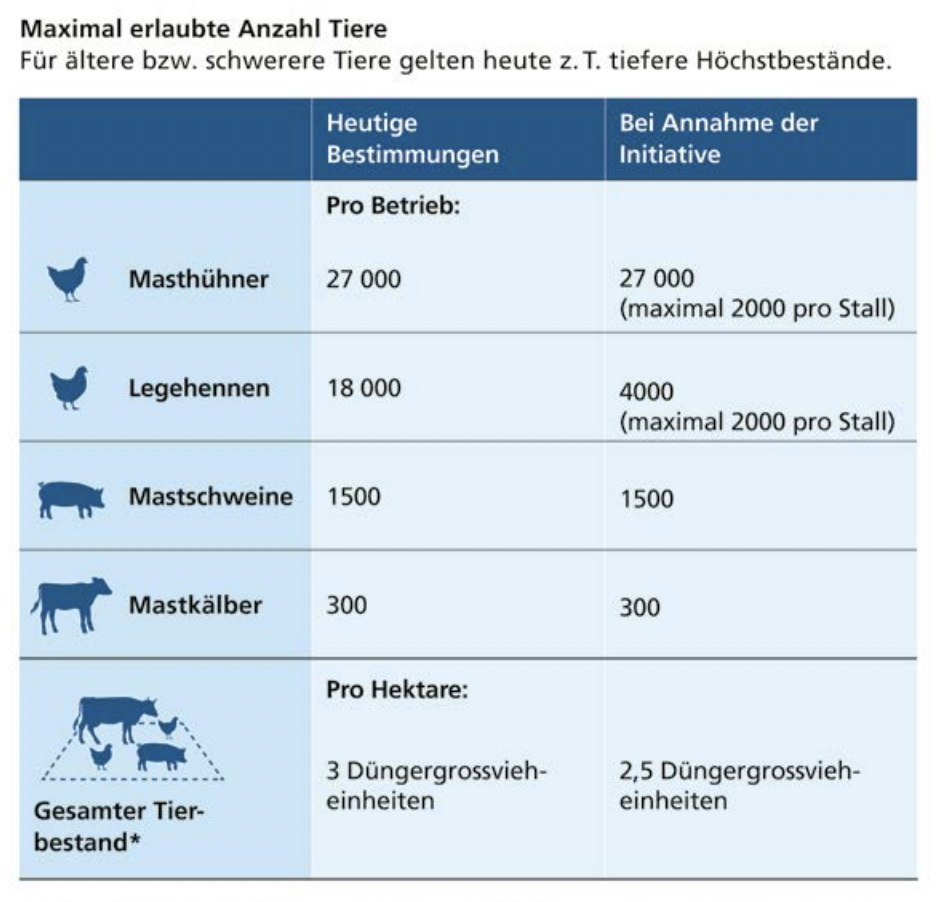Today, the Swiss electorate could have voted for the abolition of factory farming (25 years from now [1]). But, in aggregate, we did not. By a depressingly large margin. The participation (as share of the electorate) was 52.3%, of which 37.1% voted in favour of the initiative. Securing, on top of the voter majority, the cantonal majority, which would have also been required, was even further out of reach: "Canton Basel City was the only of the 26 regions to approve the idea." The initiative was launched by Sentience Politics. More info about the initiative and the results in this swissinfo.ch article (in English): Voters reject ethical overhaul of animal farming rules
In my impression, the most influential argument of the camp against the initiative was that factory farming just doesn't exist in Switzerland.[2] Even if it was only one of but not the most influential argument, I think this speaks volumes about both the (current) debate culture and the limits of how hopeful we should be that relevantly similar EA-inspired policies will soon see widespread implementation .
A key question is: What does relevantly similar mean here? A key argument, from a purely egoistic perspective, against abolishing factory farming is that, to some extent probably hard to precisely estimate in advance with much confidence, animal products will become more expensive. 1) Maybe many future EA-inspired policies would not have such costs, 2) arguably many future EA-inspired policies won't even (need to) be voted on by the electorate (in some cases it might even be sufficient to get a handful of key individual actors on board), and 3) probably there are other reasons why I have more reason to be hopeful about EA-inspired policies than I feel right now.
But still... Rarely in the history of Switzerland has there ever been an initiative that, from an EA perspective, has been of higher moral significance and simultaneously, from an EA perspective, of lower controversiality. The fact that the electorate of Switzerland (notably roughly the richest country in the world) failed to vote to abolish factory farming 1) is a testament to just how far we, as world optimisers, still have to go and, slightly more controversially 2) serves as a reminder that we can philosophise as much as we want: to the extent that bridging the gap from global priorities research and longtermist macrostrategy to the "real world" turns out to present even more of a challenge than we previously thought, we would better rethink our allocation of resources along what I'd roughly conceptualise as a theoretical/fundamental/"ivory tower" – practical/applied/"real world" dimension.[3]
1) Where do/might you (dis)agree with me? Am I missing an important consideration?
2) What's your reaction to the initiative and results?
3) What (tentative) lessons from this can we draw for the future pursuit of EA-inspired policies (within and beyond non-human animal welfare)?
- ^
- ^
While I admit the term factory farming is open to interpretation and that the extent to which fundamental interests of farm animals are systematically violated is lower in Switzerland than in most other countries, I encourage people who are skeptical as to the existence of factory farming in Switzerland to search for facts and videos on this topic. It may be less horrible than in most countries, but it is still horrible to be your average farm animal in Switzerland.
- ^
Which I find ironic given that research on the value of global priorities research compared to other endeavours is a key question within, well, global priorities research.


I work in US politics and I'm more knowledgeable about the United States, but a few points come to mind:
As for what this would look like with positive framing, it would probably take some careful thought but maybe end up with ballot text something like "Healthy/Natural Farms Initiative - ensure all farm animals live in healthy, safe, and humane conditions"
If we combine that with something more incremental, it might look like "Open stables initiative" "Ensure farm animals live free from disease causing overcrowding and confinement" or "have __ time outside cages." A more specific narrow initiative may have helped against arguments that "factory farms don't exist" which is perhaps harder to pin down what it means to people.
A series of narrow initiatives could potentially be more effective at eroding cruel conditions over time than a binary yes or no abolish ballot initiative that takes effect in 25 years since there are more chances for change to accumulate and less change on the ballot all at once.
*I don't really know much about specific policy interventions or mechanisms of change that would be narrow and impactful in the factory farming space, so someone else could probably improve these.
Great points--especailly the positive framing. On the surface it seems valid, although I'd want to see evidence to support the positive framing perspective. Also, I really like how you give examples to back up your points.